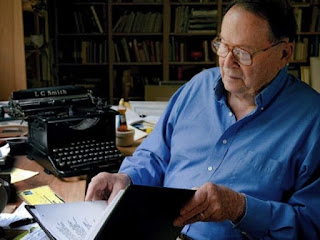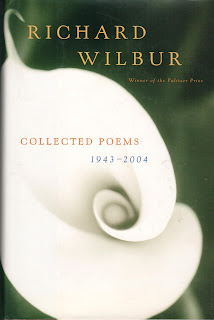Dark news today in the New York Times--the announcement of the death of poet Richard Wilbur, a writer whose works both Joyce and I deeply admire. And love. (Link to Times story.)
I can't remember when I first read him--but once I did, I felt as if I always had. Over the years I've memorized a few,* so today, on this dim day, I feel as if a part of him is still alive in my wee brain.
A story ...
Back in 2005 my mom, 86 at the time, was still living on her own in western Massachusetts and regularly attended St. Stephen's Parish, an Episcopal Church in Pittsfield. Until his death in 1999 my dad had also gone there--had sung in the choir (oh, he had a wonderful, pure tenor voice). Anyway, one day I was talking with my mom on the phone about a Richard Wilbur poem I really liked, and she told me this stunning news: "He goes to our church."
Well!
It seemed a bit odd to me at the time: Wilbur lived in Cummington, Mass. (the same town, by the way, where William Cullen Bryant had lived), a very small town about twenty-five miles east of Pittsfield--a pretty good drive on a Sunday morning.
But I let that pass and got right to it: "Mom, if I send you some of his books, do you think he would sign them?"
Mom sighed. This was not exactly her "thing." But she agreed to ask him. I mailed the books. And not long afterward, here they came, inscribed in his clear hand.
Below, you see one of them--with the inscription ...
One of Wilbur's most moving poems, "The House," appeared in The New Yorker on August 31, 2009. His wife of sixty-four years, Charlotte, had died in April 2007. (Link to her obituary.) How could this poem be about anyone else?
THE HOUSE
Sometimes, on
waking, she would close her eyes
For a last look at
that white house she knew
In sleep alone, and
held no title to,
And had not entered
yet, for all her sighs.
What did she tell me
of that house of hers?
White gatepost;
terrace; fanlight of the door;
A widow’s walk above
the bouldered shore;
Salt winds that
ruffle the surrounding firs.
Is she now there,
wherever there may be?
Only a foolish man
would hope to find
That haven fashioned
by her dreaming mind.
Night after night,
my love, I put to sea.
As Shakespeare wrote in Sonnet 18, "So long as men can breathe or eyes can see, /
Wilbur's words gave life to everything that fell under his gaze, that worked its way through his heart and mind and flowed from his fingers out onto the page.
*the Wilbur poems in my head ...
“Ecclesiastes 11:1”
“The House”
“April 5, 1974”
“Year’s End”
“Boy at the Window”




No comments:
Post a Comment